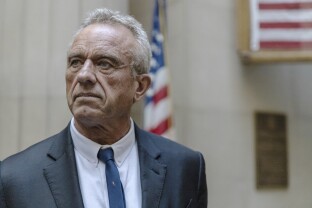President-elect Donald Trump announced on Thursday that he had nominated Robert F. Kennedy Jr. for secretary of the Department of Health and Human Services, a move with an uncertain path through the Senate.
If confirmed as HHS secretary, Kennedy would be at the helm of the agencies that direct much of public health in the U.S., including the Centers for Disease Control and Prevention, the National Institutes of Health and the Food and Drug Administration.
Kennedy’s nomination to a cabinet-level position culminates in a meteoric rise into the mainstream for the former environmental lawyer turned anti-vaccine activist and a remarkable partnership between two one-time political rivals. After Kennedy’s own presidential bid ended in August, he endorsed Trump after unsuccessfully seeking meetings with the Harris campaign.
Kennedy became an important surrogate for Trump in the last few months of the presidential race, speaking at Trump rallies about his goal to fight chronic disease by “cleaning out” the public health agencies and rewriting regulations to prioritize regenerative agriculture.
“What we don’t really need at HHS is more medical expertise. What we need is an expertise on decoupling the agency from institutional corruption. Because it’s the corruption that has distorted the science,” Kennedy said in late September.
His “Make America Healthy Again” platform sought to unite Kennedy’s desire for increased regulation of Big Pharma and Big Food with Trump’s desire to cut back on the size of the federal government — two things that at times seemed diametrically opposed.
But Trump said he backed Kennedy’s goals during his rally at Madison Square Garden in late October.
“I’m going to let him go wild on health. I’m going to let him go wild on the food. I’m going to let him go wild on the medicines,” Trump said.
If Kennedy’s bid for HHS secretary is successful, it would come as a blow to many health experts who see his views as antithetical to the role of the agency and dangerous to the public health of the country.
Throughout the ’80s and ’90s, Kennedy was best known as a fervent environmentalist and a lawyer with a track record of winning legal battles against corporations accused of polluting. Since 2005, however, he has promoted public health conspiracy theories and claims that vaccines cause widespread health issues, including autism. During the COVID-19 pandemic, he became well known for his opposition to vaccine mandates and for promoting unproven alternative COVID-19 treatments.
Kennedy’s activism during the pandemic sets off how different this Trump administration may be from the last: One of the president-elect’s principal achievements while in office was the COVID-19 vaccination development program, Operation Warp Speed.
While Kennedy recently told NPR that he won’t “take vaccines away from anybody” if given a significant role in the new Trump administration, he has made clear that he sees the current state of the public health agencies in the U.S. as unacceptable.
“If you work for the FDA and are part of this corrupt system, I have two messages for you: 1. Preserve your records, and 2. Pack your bags,” Kennedy posted on X late last month.
Democratic lawmakers said they were concerned about the potential that Trump would give Kennedy a significant role before the decision was announced.
“We should be very concerned as a country that RFK Jr. could be put in charge of health when he is a vaccine denier and has caused great harm to the American public,” said Rep. Mike Garcia at a House Oversight Select Subcommittee on the Coronavirus Pandemic hearing on Thursday.
Rep. Jill Tokuda echoed Garcia, saying, “Under the false pretense of making America healthy again, President-elect Trump and RFK Jr. have committed to an extreme agenda that promises to hamstring our federal health agencies and their essential work to keep Americans safe.”
—
Margaret Manto is a NOTUS reporter and an Allbritton Journalism Institute fellow.
Sign in
Log into your free account with your email. Don’t have one?
Check your email for a one-time code.
We sent a 4-digit code to . Enter the pin to confirm your account.
New code will be available in 1:00
Let’s try this again.
We encountered an error with the passcode sent to . Please reenter your email.


